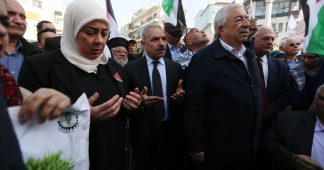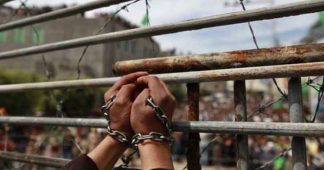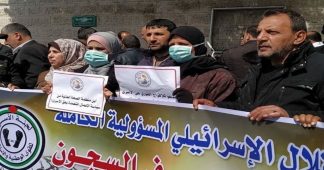Sami al-Amour was denied family visits for years and died as a result of ‘medical negligence’, according to a Palestinian official
Maha Hussaini
18 November 2021
photo: MEE/Mohammad al-Hajjar
A Palestinian prisoner died in Israeli custody at Soroka-University Medical Center on Thursday, a death which Palestinian authorities have slammed as “deliberate medical negligence by the Israeli prison administration”.
Sami al-Amour, 39, who was detained in 2008 and was serving a 19-year prison sentence, suffered from heart problems. He was transferred to the hospital a few days before his death, following a severe deterioration in his health.
According to the Ministry of Detainees and Ex-Detainees Affairs in Gaza, Amour endured harsh conditions during his detention.
Amour’s fiancee, Ghada Abujame, received the news of his death early in the morning, and rushed to his family home in Deir al-Balah, in the central Gaza Strip.
“He spent more than 13 years in prison and only five more years were left until he would be released. He had hope and dreamed of the day of his release when he would be free and start a new life with me,” the 32-year-old told Middle East Eye.
“I cannot imagine that he’s gone at a time when I was planning for our life together. I was dreaming of the day he would be released, when we would get married and finally live a stable life,” she continued.
“He wanted to have three children with me and even chose names for them; he wanted to name his first son Yasser after the name of [former Palestinian president] Yasser Arafat, and he wanted to name the other two children Falastin [Arabic for Palestine], and Watan [Arabic for homeland].”
Although she had been engaged to him for five years, Abujame first met Amour 14 years ago, shortly before he was detained.
“Our relationship started with a fight. We were in the al-Balad [popular market] and he unintentionally hit my shoulder while he was walking. I scolded him and we fought, then he followed me to my home to know where I lived, because he said he liked me at first sight,” she recalled.
“We started talking and then he disappeared for a whole year. I thought back then that he had left me or did not want to talk to me anymore, but then I received a call from him. He told me that he was in prison but that he could never forget my phone number,” she continued.
“He asked me if I would wait for him another 18 years, I said I would wait for him my whole life.”
Amour’s favourite topic to talk about during his short calls with Abujame was the arrangements for his day of release. He wanted to immediately go to her home to get married to her.
“He wanted his family to welcome him with a Fadous [wedding procession], and he told me not to wait for him at the border with them on that day, he wanted to come to my home himself to take me as a bride.”
Denied family visits
Abujame could never visit her fiance in prison, because the Israeli authorities only allow first-degree relatives and documented wives to apply for visit permits.
But she sent him gifts with his mother every time she visited him. When she could not call him, Abujame and his family used to send messages through a radio programme in which the announcer reads messages of prisoners’ families to their children in Israeli prison, as a way to challenge the Israeli restrictions on visits and phone calls.
Although his mother was the only person allowed to visit him, she had not been able to see him for the past four years due to Israeli restrictions.
“I tried everything and called everyone to help me get a permit to visit him, but in vain. They [Israeli authorities] had prevented me from seeing my son for more than four years, and now he died alone,” his mother, Um Sami, told MEE.
“They said that he was suffering congenital heart problems, but he lived here with me for over 25 years and was very active as a child and young man. Why did we not see this problem except after he was imprisoned?
“All his health problems appeared in prison, and his health deteriorated only two months ago when they could have saved his life, but all they did was give him painkillers until they had to move him to the hospital.”
‘Silent execution’
According to the Ministry of Detainees and Ex-Detainees Affairs, giving Palestinian prisoners painkillers instead of proper medical treatment is part of the medical negligence the prison authorities adopt to let prisoners “die slowly”.
“We are witnessing a new crime by the Israeli prison administration that has deliberately adopted a policy of medical negligence against Amour and hundreds of other prisoners,” Islam Abdu, a spokesperson for the Palestinian ministry, told MEE.
“The occupation deliberately procrastinated moving Amour to the hospital to receive proper medical treatment until it was too late to save his life. This is a responsibility that the prison administration shoulders.”
According to Abdu, at least 227 Palestinian prisoners have died in Israeli custody since 1967, including 79 due to medical negligence.
Around 4,600 Palestinians remain in Israeli prisons, including 32 women and 220 children. Of those, around 700 have illnesses, including chronic diseases and cancer.
“Considering the Israeli policy towards Palestinian prisoners, Amour will not be the last one to die in Israeli custody. Hundreds of prisoners suffer different diseases and are waiting for medical treatment or urgent surgeries, while the occupation is turning a blind eye to their suffering,” he added.
“What we are talking about is an undeclared policy of silent execution of Palestinian prisoners, in order to get rid of them under the pretext that they were already sick. That is an easy way for the occupation to kill Palestinians and avoid international criticism and accountability.”
Last week, Palestinian prisoner Miqdad al-Qawasmeh ended a 113-day hunger strike in protest at his administrative detention, after he reached an agreement with the Israeli prison to release him next February.
The agreement came after the prisoner was admitted to the intensive care unit at Kaplan Medical Centre in Rehovot, following a severe deterioration in his health in October
Other prisoners continue hunger strikes until further notice, in protest at their administrative detention without any charge or trial. Many of them are suffering rapid health deterioration.
Of the Israeli prisoners in Israeli jails, 500 are serving administrative detention, according to the Addameer Prisoner Support and Human Rights Association.
In October, United Nations experts called on Israel to either release or charge five Palestinian prisoners on hunger strike in its prisons, urging it to “end its unlawful practice of administrative detention”.
“In violation of international law, Israel continues to use administrative detention to imprison more than 500 Palestinians – including six children – without charges, without trials, without convictions, all based on classified secret information that the detainees have no access to,” the experts said.
‘They killed him psychologically’
Amour, who had requested medical care for his heart problems, was finally transferred to a hospital a few days before his death.
He called his fiancee and his sister, Buthaina, to tell them he was being moved to the hospital with both his hands and legs chained.
“He phoned and was crying. He told me that he was chained although he was very sick, he said: ‘They chained me because they are afraid I would escape. But how would I escape when I’m that sick?’,” Buthaina, 39, told MEE.
“They meant to break his spirit and prevent him from seeing his family even when he was dying. He asked us not to be sad if he could not talk to us again, as if he knew he was going to die.
“They killed him psychologically long before he was physically dead.”
Published at www.middleeasteye.net
We remind our readers that publication of articles on our site does not mean that we agree with what is written. Our policy is to publish anything which we consider of interest, so as to assist our readers in forming their opinions. Sometimes we even publish articles with which we totally disagree, since we believe it is important for our readers to be informed on as wide a spectrum of views as possible.











